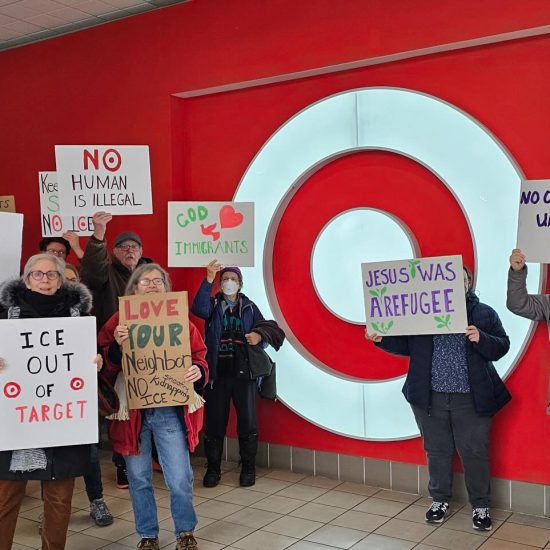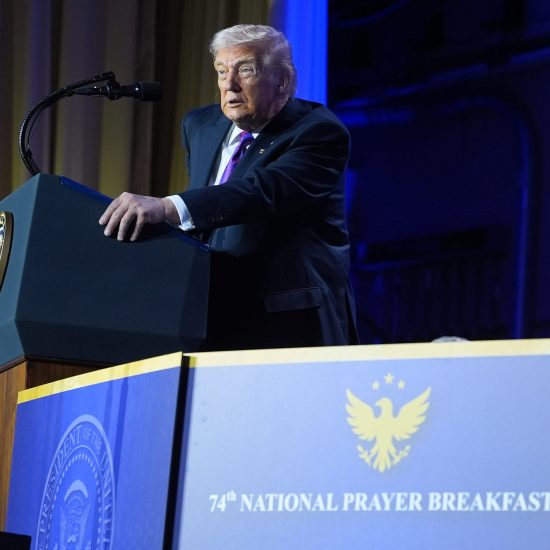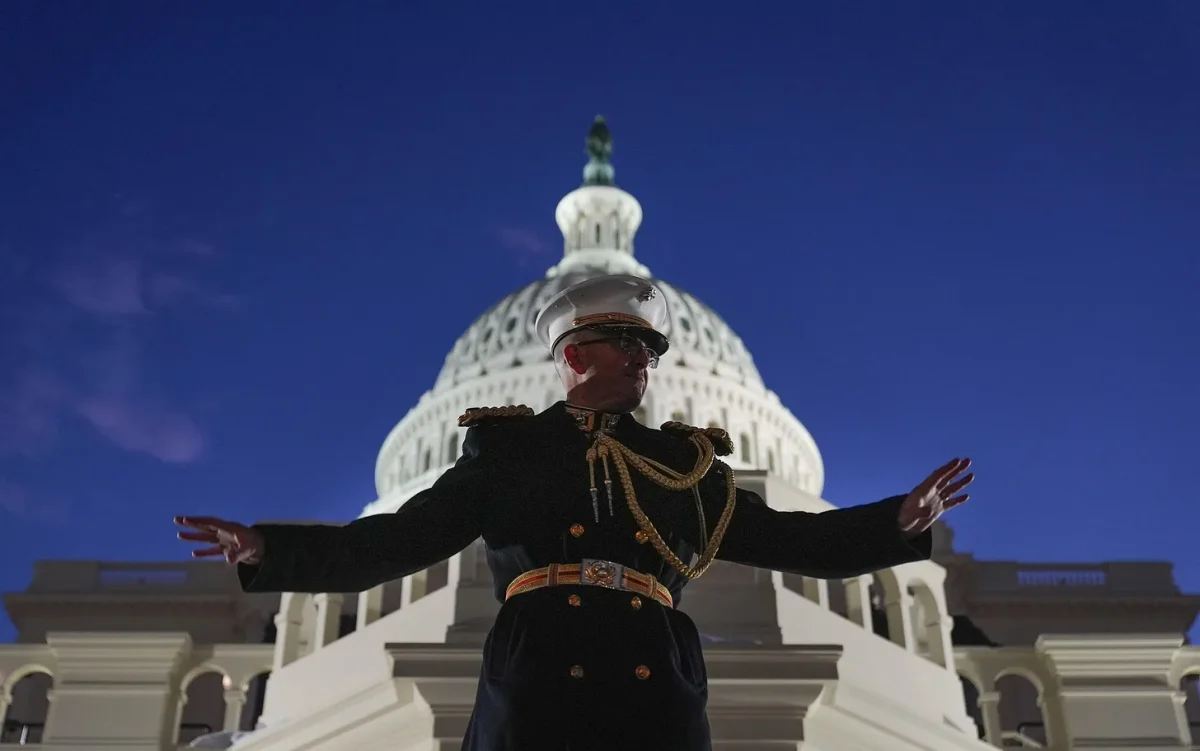
As Donald Trump prepared to take the presidential oath of office nearly eight years ago, he sat in a Washington, D.C., church. But while the special service for the occasion occurred in a progressive Episcopal church, Trump didn’t hear a message about God’s love for all people or the importance of loving one’s neighbors. Instead, he heard a sermon declaring God had put him in power to build the wall.
“God has raised you and Vice-President-elect Pence up for a great, eternal purpose,” Southern Baptist MAGAchurch pastor Robert Jeffress told Trump during the service. “When I think of you, President-elect Trump, I am reminded of another great leader God chose thousands of years ago in Israel. … God chose a builder whose name was Nehemiah. And the first step of rebuilding the nation was the building of a great wall. God instructed Nehemiah to build a wall around Jerusalem to protect its citizens from enemy attack. You see, God is not against building walls!”
Jeffress, pastor of First Baptist Church in Dallas, Texas, had campaigned for Trump. He had even declared he would vote for Trump over Jesus, explaining on NPR, “I don’t want some meek and mild leader or somebody who’s going to turn the other cheek. I’ve said I want the meanest, toughest SOB I can find to protect this nation.” True to that tone, Jeffress stood in the pulpit at St. John’s Episcopal Church and reassured his chosen politician that God was on Trump’s side and supported building the wall (though Jeffress didn’t say if God wanted Mexico to pay for it). Rather than urging Trump to enter office with humility and seek to bring the nation together, Jeffress insisted God supported Trump and therefore the incoming president should accept that divine mandate to ignore those who disagree on policy proposals.
“Mr. President-elect, I don’t believe we have ever had a president with as many natural gifts as you,” Jeffress said in the church across the street from the White House. “President-elect Trump, you, Vice President-elect Pence, and your team have been called by God and elected by the people to do a great work. It is a work far too important to stop and answer your critics.”
About three-and-a-half years later, Trump returned to St. John’s. But this time it wasn’t for a service to hear how God chose him. Instead, after police teargassed peaceful protesters (and an Episcopal priest on the church’s property), Trump walked across the street and held up a Bible for a political photo op. That moment sparked outrage from Episcopal leaders (and many others), including the church’s rector (Rev. Robert Fisher) and the head of the diocese (Bishop Mariann Budde).
Next Monday (Jan. 20), Trump will return to that church for the first time since the infamous photo op in 2020. Once again, the church will host a special worship service on the morning of the presidential inauguration. Christian Nationalism is a tough drug to quit, even for some progressives who employ it to sanctify the presidency of one they oppose. But changes are in the air. This time there won’t be a sermon by Jeffress or anyone else. And a service the next day at the Washington National Cathedral, another Episcopal church, is also undergoing a shift in format. So this issue of A Public Witness considers the upcoming prayer services for the presidential inauguration and the problems with access spirituality.
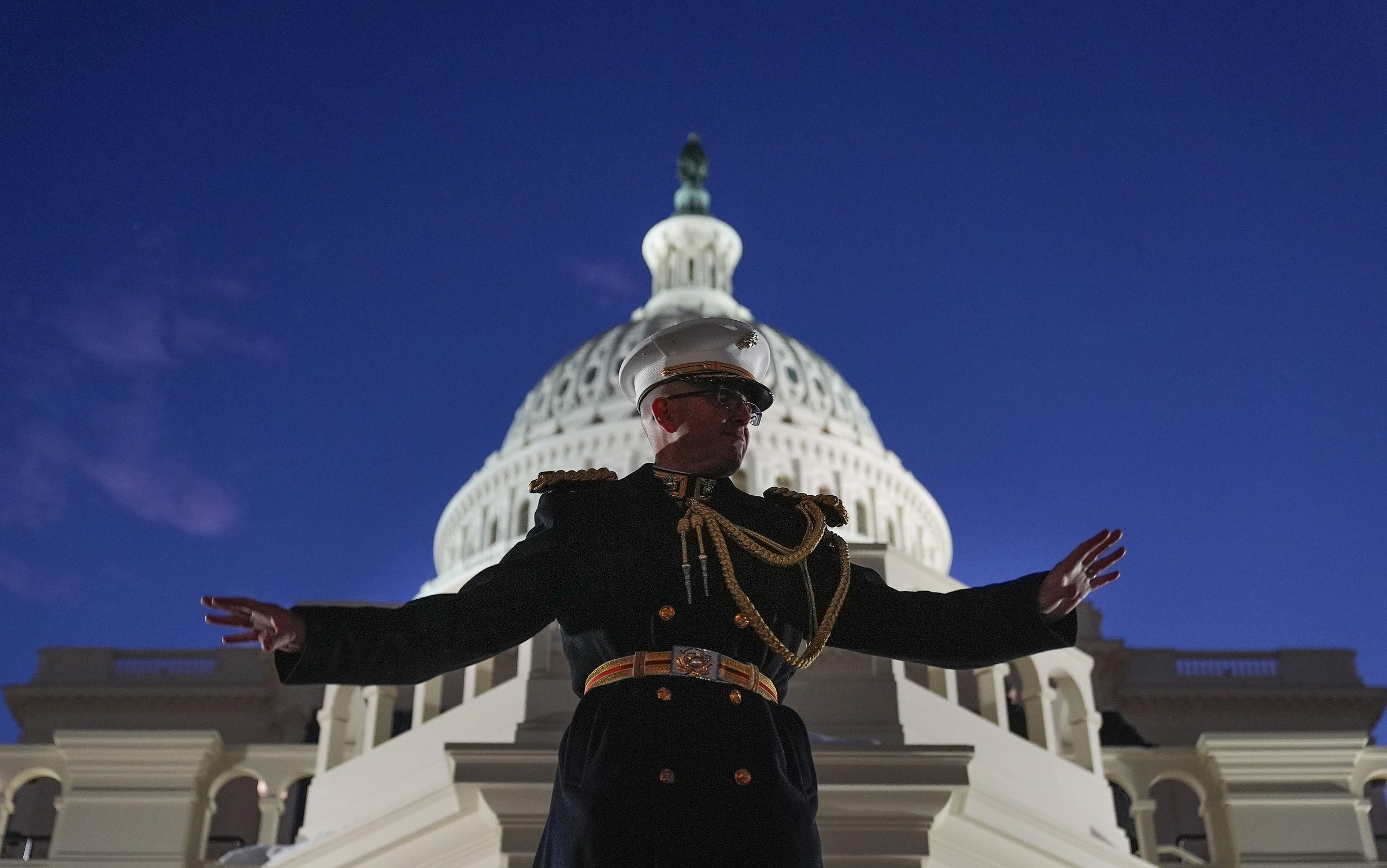
The U.S. Capitol looms behind Lt. Col. Ryan Nowlin, director of “The President’s Own” U.S. Marine Band, during the rehearsal of President-elect Donald Trump’s swearing-in ceremony, on Jan. 12, 2025, in Washington, D.C. (Pablo Martinez Monsivais/Associated Press)
Hail to the Chief
Since President Franklin D. Roosevelt, an Episcopalian, took the oath of office for the first time in 1933, most presidents have participated in a worship service on inauguration morning. And half of those have occurred at St. John’s Episcopal Church, which calls itself “the church of the presidents.” FDR held all four of his services there, and Harry Truman, Ronald Reagan, George H.W. Bush, George W. Bush, Barack Obama, and Trump also attended services there before their public swearing-in ceremonies. Of those, only the first Bush was an Episcopalian.
Other than Richard Nixon, who did not attend a service in a church on inauguration morning, the other presidents picked different churches in D.C., usually in the denomination with which they affiliated. John F. Kennedy and Joe Biden both attended services in Catholic churches. Lyndon Johnson went to one at National City Christian Church. And Jimmy Carter attended at First Baptist Church (which he soon joined). Bill Clinton, who was also Baptist, instead held services both times at a Black AME church.
Additionally, several presidents over the last century attended a worship service at the Washington National Cathedral — which is an Episcopal church — near their inauguration ceremony (usually on the day after). This included FDR, Reagan, both Bushes, Obama, Trump, and Biden. These services have tended to be an interfaith event with lots of religious leaders involved to lead prayers, read Scripture, or speak.
The inaugural services at these two Episcopal churches in D.C. are just some of the examples of how mainline Protestants helped build Christian Nationalism. That’s why Beau Underwood and I addressed them — and other aspects of St. John’s and the Washington National Cathedral — in our book Baptizing America. As we noted about St. John’s, the 2017 inaugural prayer service with Robert Jeffress proved particularly problematic since “the church turns the pulpit over to the choice of the new president” and therefore they “didn’t offer a prophetic warning as Trump took office.”
“It’s a church that willingly plays an outsized and public role in the spiritual (and political) lives of U.S. presidents as it participates in presidential pageantry and affords presidents special status (including a reserved pew). Such treatment toward the commander-in-chief is difficult to square with the admonitions in the Book of James against offering the rich and powerful a privileged seat (2:2-4). It also conflicts with the church’s own witness,” we added. “Despite its social justice activism that seeks to alter the status quo, the congregation offers a unique form of legitimacy to the powers that be. It’s difficult to simultaneously be Christ’s Church and the Church of the Presidents. It’s hard to serve in the king’s court and also speak as the prophet.”
Similarly, we noted about the Washington National Cathedral that while the church hosted Trump for its service the day after the inauguration, the streets of D.C. were filled with the “Women’s March” protesters opposing Trump’s rhetoric and policies. But inside, Episcopal leaders like Bishop Budde and Cathedral Dean Randolph Marshall Hollerith participated in a religious stamp of approval on Trump’s administration, along with various Trump-backing evangelicals like Ronnie Floyd, Jack Graham, David Jeremiah, Greg Laurie, Cissie Graham Lynch, and Darrell Scott. We noted in Baptizing America that Budde and cathedral leaders joined others “on numerous occasions in criticizing comments and actions by Trump, but only after first blessing him while others offered a prophetic warning about the character of the new leader.”
“Seeking to be a prominent, neutral gathering place in Washington, D.C., for elite events is what creates confused moments,” we added. “In seeking to serve national purposes, the cathedral faces the constant threat of compromising its integrity as a great church.”
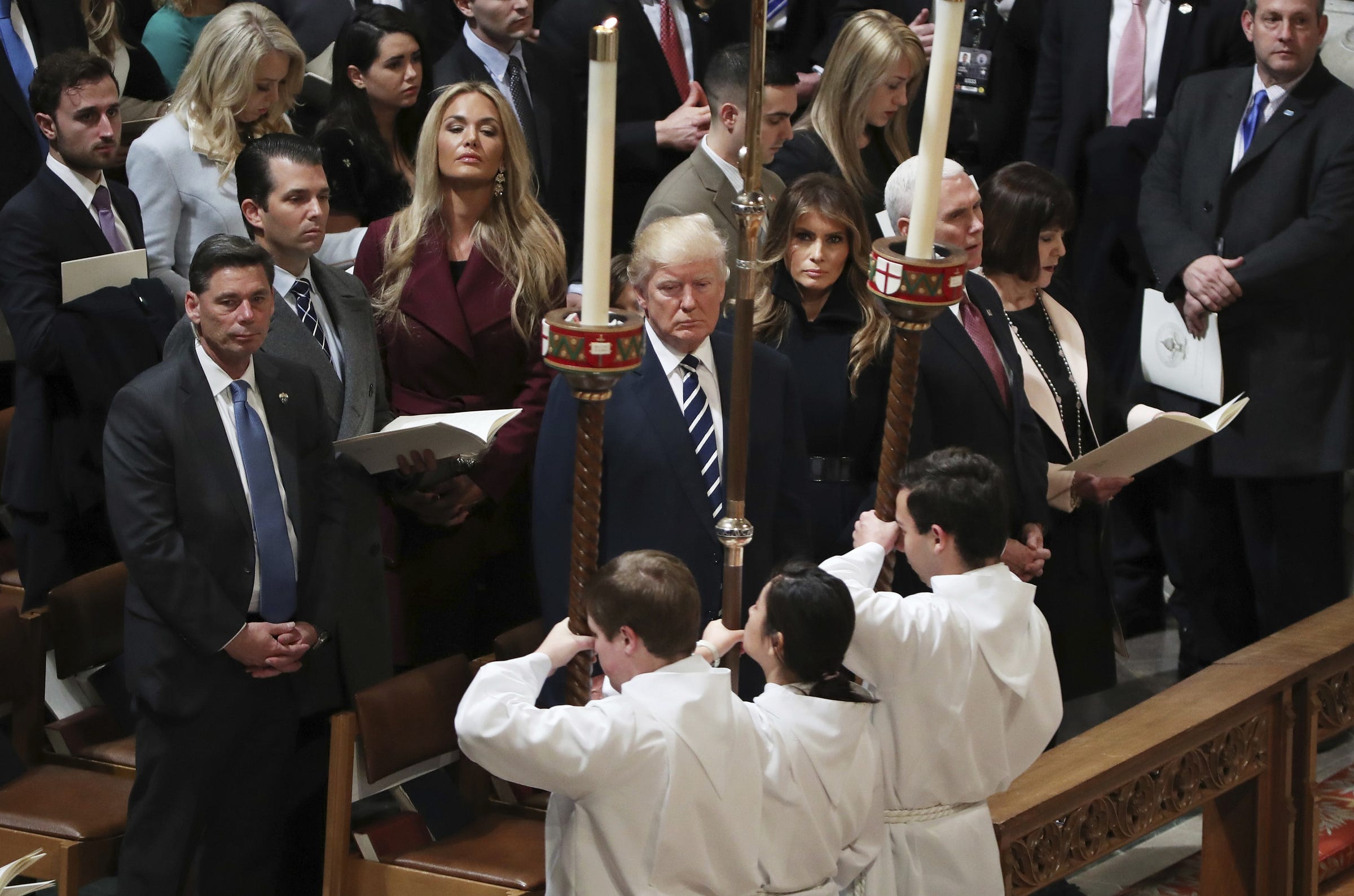
President Donald Trump (center) watches the altar children carry candles during a National Prayer Service at the Washington National Cathedral in Washington, D.C., on Jan. 21, 2017. (Manuel Balce Ceneta/Associated Press)
The two churches are attempting a different approach this time. The Washington National Cathedral announced even before election day that they would refocus their service on the day after the inauguration to be “a special interfaith ‘Service for the Nation’” focused on “the need for healing and national unity.” Additionally, they mentioned they had already created the service, which would feature a sermon by Bishop Budde.
“We are in a unique moment in our country’s history, and it is time to approach this differently,” Cathedral Dean Hollerith said. “This will not be a service for a new administration. … Regardless of who the president is or whether he or she attends, the liturgy will center on the country.”
Crafting the liturgy prior to the election was a good shift, as was maintaining control over the service and who speaks. However, as the cathedral confirmed to me last month, they still designed the service with the goal of the new president attending. And it’s now listed among the various events for Trump’s inauguration. Should he attend, Trump will still get the imagery of the cathedral and its service as a blessing on his inauguration, even if the liturgy and rhetoric are less likely to veer into partisan talking points. Additionally, as their statement made clear about how “the liturgy will center on the country,” Christian Nationalism will likely still be quite prominent in the service.
St. John’s is also opening its sanctuary again for Trump, albeit also with some changes. Rev. Robert Fisher, the church’s rector, told the congregation in an email on Saturday that the church had been asked to host the service as part of Trump’s inaugural festivities. But, he added, the service will not include a sermon and the church is crafting the time to be “Episcopal in nature” like those first held for FDR.
“In a departure from recent years, when the service had grown to include many visiting guest clergy and others, I am intentionally returning it to its original, simpler nature,” explained Fisher, who was leading the church when Trump had his photo op in 2020 but not at the time of the Jeffress service in 2017. “The service will be about upholding our values, especially Jesus’s commandment to love one another without reservation.”
Fisher added that the service will include prayers, Scripture passages, and hymns based on the Episcopal liturgy. It will also include the “Roosevelt Prayer,” which former St. John’s Rector Oliver Hart wrote for one of the church’s services they held each year for FDR on the anniversary of his first inauguration.
“This will be the 14th pre-inaugural prayer service at St. John’s, and surely not the last,” Fisher wrote in his email. “I am glad that we will be continuing this tradition, and I humbly pray that our call to prayer will be a blessing that helps orient and ground the leaders of the nation on a momentous day both in their lives and in the life of our country.”
The changes will clearly bring a better service than the God-chose-you-so-build-the-wall sermon eight years ago. Yet, like the cathedral service, the one at St. John’s will give the incoming president a good photo op as a holy leader. And following the church’s self-image as the “church of the presidents,” the attempt to craft a presidential liturgy for the service shows that while they’re shedding the partisan, Christian Nationalistic guest preachers, they’ve not deconstructed their own Christian Nationalism.
Get cutting-edge reporting and analysis like this in your inbox every week by subscribing today!
Partisan Prayers
In addition to the prayer services at St. John’s and the Washington National Cathedral, there will also be six prayers during Trump’s inaugural service on Monday. Since 1937, only two inaugurations had more than four prayers — Nixon’s first with five and Trump’s first with six.
The two invocations will be given by Catholic Cardinal Timothy Dolan of New York and evangelist Franklin Graham. Dolan, who similarly prayed during Trump’s first inaugural, hosted Trump during the campaign and in December insisted on Fox News that Trump “takes his Christian faith seriously.” Graham, who also prayed at Trump’s first inaugural and W. Bush’s first, has been even more strident in his support of Trump and spoke at the 2024 Republican National Convention. Graham’s father, Billy, prayed at inaugurals for Nixon, H.W. Bush, and Clinton, and he spoke at multiple inaugural prayer services (including ones at both St. John’s and the Washington National Cathedral).
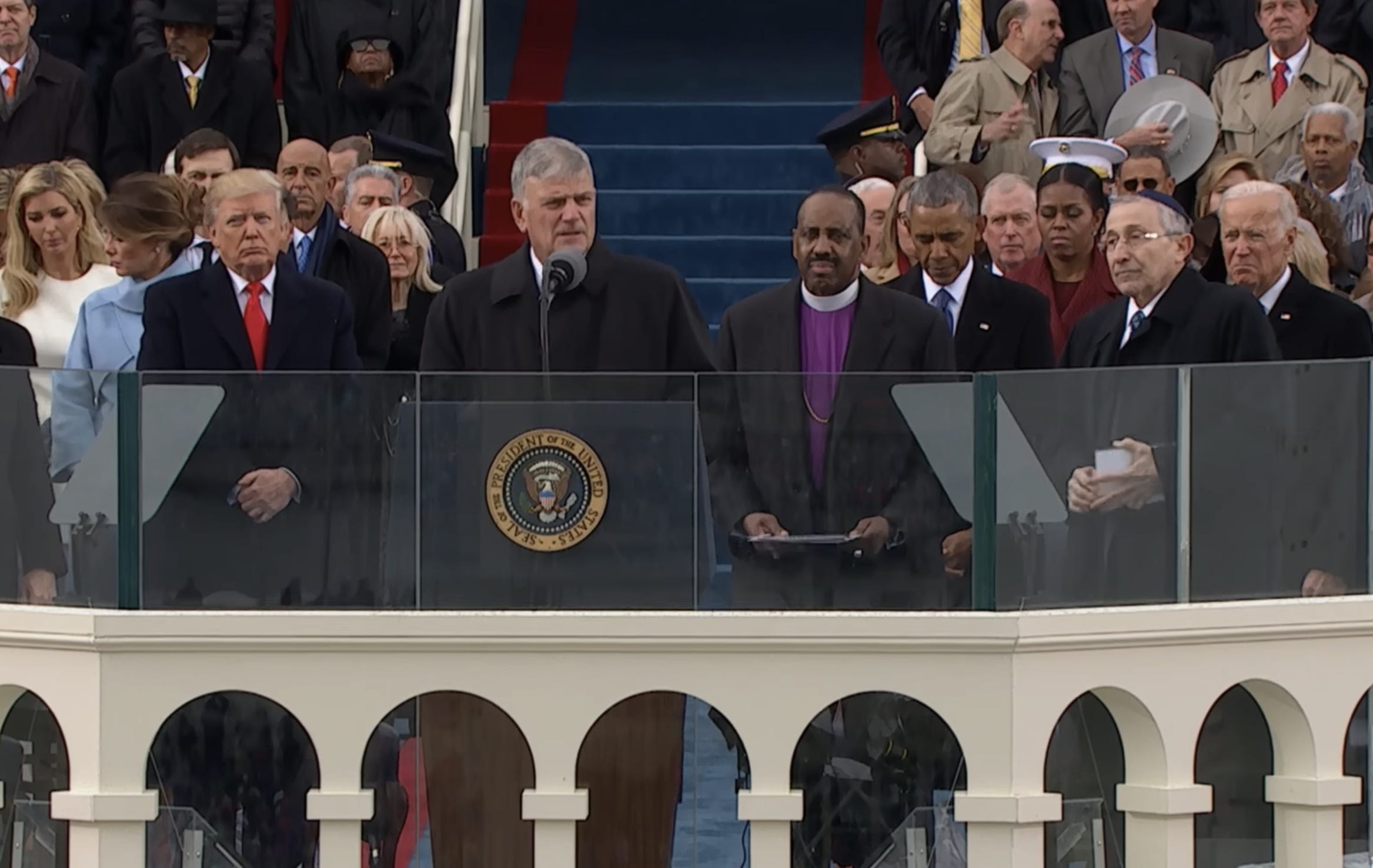
Screengrab as Franklin Graham offers a prayer during Trump’s first inauguration at the U.S. Capitol in Washington, D.C., on Jan. 20, 2017.
After the oaths of office, Trump’s inaugural address, and music like “America the Beautiful” by Carrie Underwood and “The Battle Hymn of the Republic” by the U.S. Naval Academy Glee Club, there will be an interfaith quartet of benedictions. The four offering prayers will be Rabbi Ari Berman of Yeshiva University, Imam Husham Al Husainy of the Karbala Islamic Center, Pastor Lorenzo Sewell, and Catholic Father Frank Mann. Sewell, who hosted Trump for a campaign event at his church in Detroit, Michigan, spoke at the Republican National Convention. Standing at the podium a few days after Trump survived an assassination attempt, Sewell declared Trump had been saved by God “for such a time as this.” He also used a popular meme at the time to argue that since Trump was shot at 6:11 p.m., Ephesians 6:11 showed God protected Trump. However, Sewell then quoted not Ephesians 6:11 about the “armor of God” but Ephesians 6:10 about being “strong in the Lord.” And like at the RNC, Trump will enter as Lee Greenwood sings “God Bless the U.S.A.” (though no word yet on if he’ll take the oath while swearing on a God Bless the USA Bible).
The list of clergy members participating in the inauguration shows an attempt to elevate those with a history of supporting Trump. A similar approach occurred eight years ago at the prayer services at both St. John’s and the Washington National Cathedral. That highlights how the shift by those two churches will positively change the tone of religion around the inauguration but also the risk of still being part of the inaugural festivities.
Next week’s events will include a lot of things. There will be a “victory rally” on Sunday before Monday’s ceremonies, various inaugural balls, and a “One America, One Light” service on Sunday for those who give at least $100,000 to Trump’s inauguration. There are also other unofficial worship events being held, including one by Trumpian worship leader Sean Feucht (that had to move locations after he claimed it would be at a Catholic church that didn’t give permission) and an “inauguration praise and prayer convocation” by Christian Nationalistic group the Family Research Council set to be held at a Black Baptist church with a “Black Lives Matter” banner over its door. But unlike the Feucht and FRC events, those at St. John’s and the Washington National Cathedral make the schedule of events for Trump’s inauguration. They’re still part of it, even if they’ve toned down the partisanship and the president-elect’s influence on the services.
It’s easy to point to the Christian Nationalism of Feucht and the FRC — and I’m sure those events will include not only MAGA talking points but also Christian Nationalism. But the events actually listed as part of Trump’s inaugural festivities and which the new president and other political leaders are expected to attend are more positioned to advance Christian Nationalism than unofficial side events. And once again, it’s not evangelicals like Feucht or the FRC but progressive mainline Protestants helping inaugurate Christian Nationalism.
As a public witness,
Brian Kaylor


